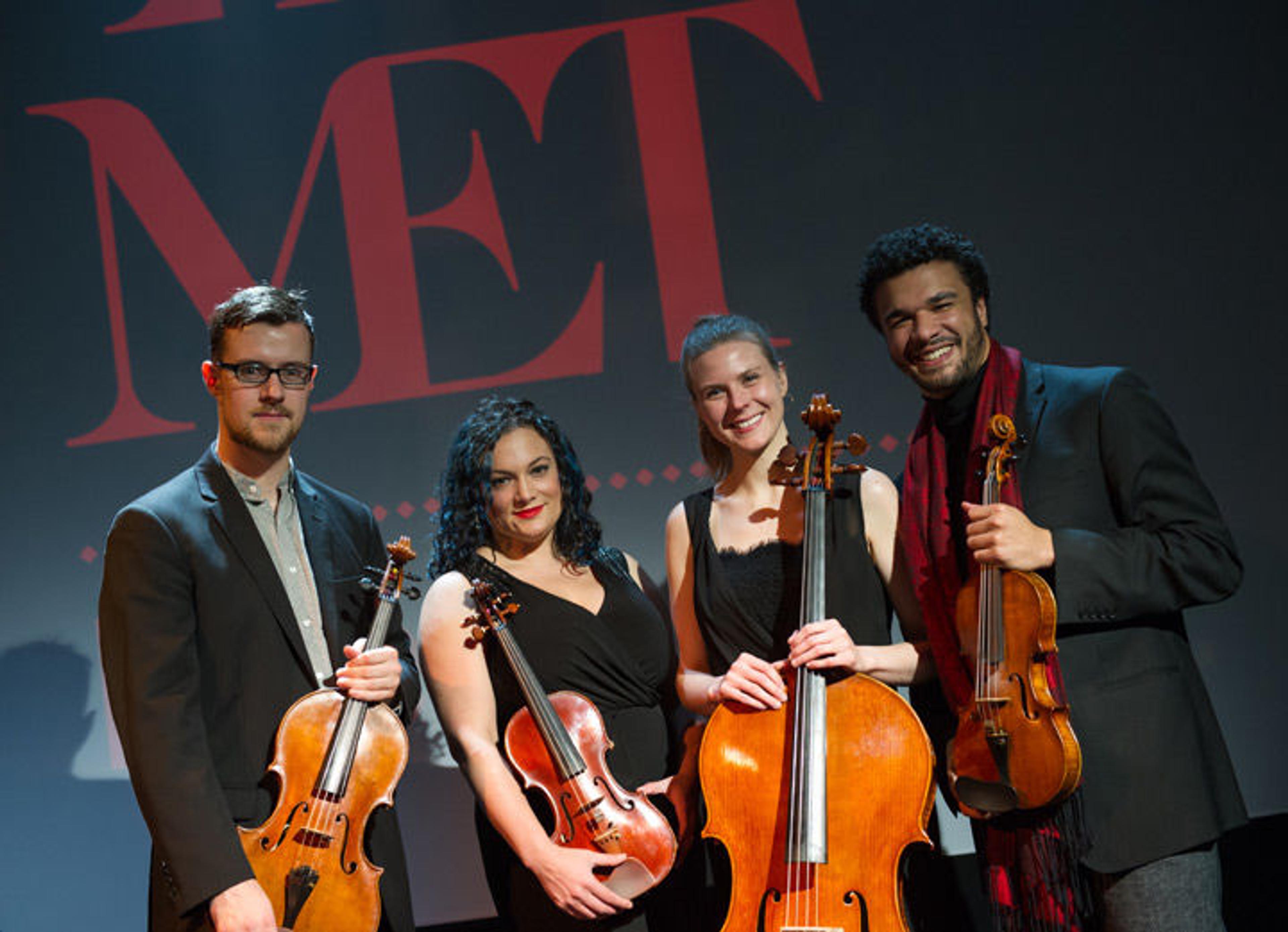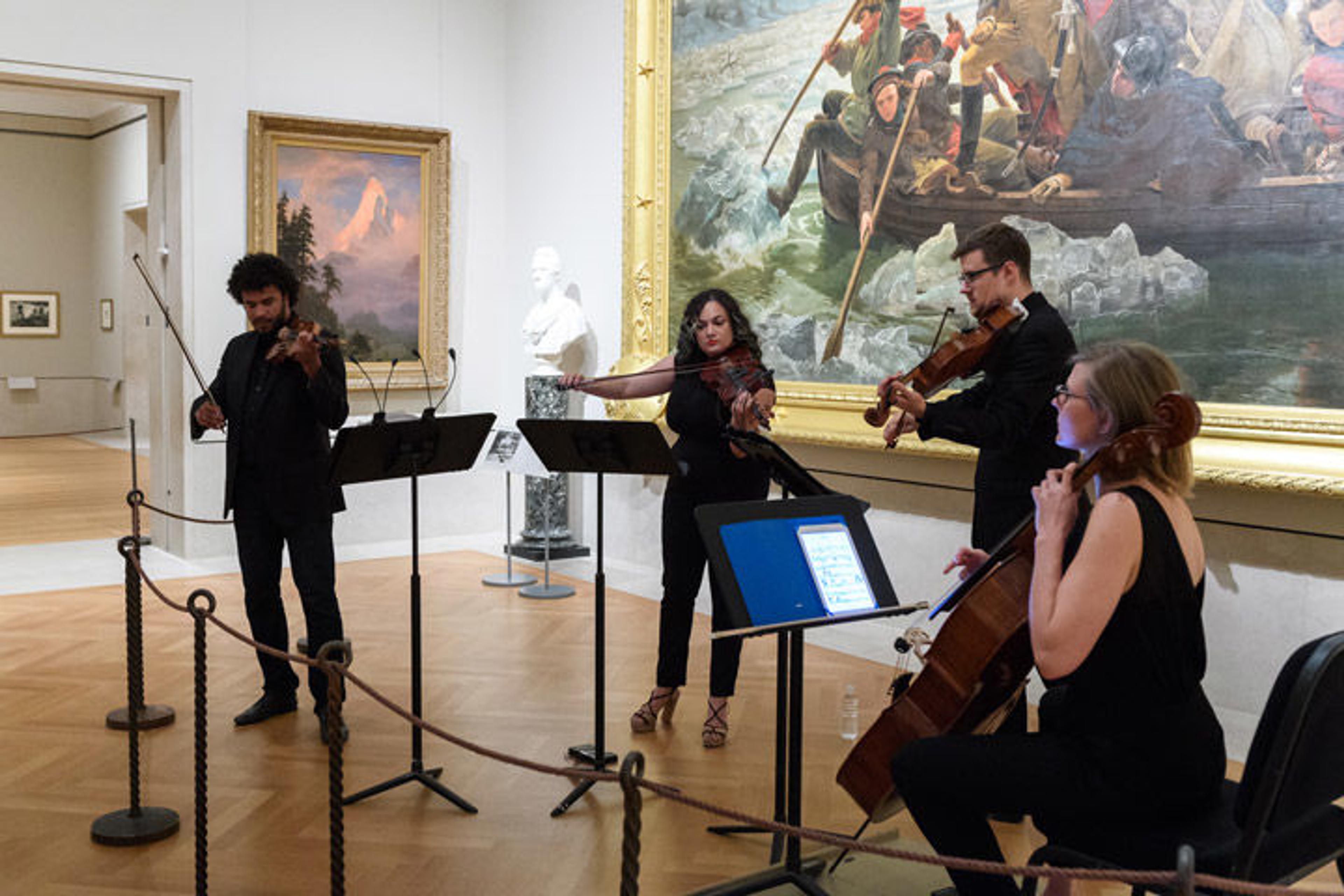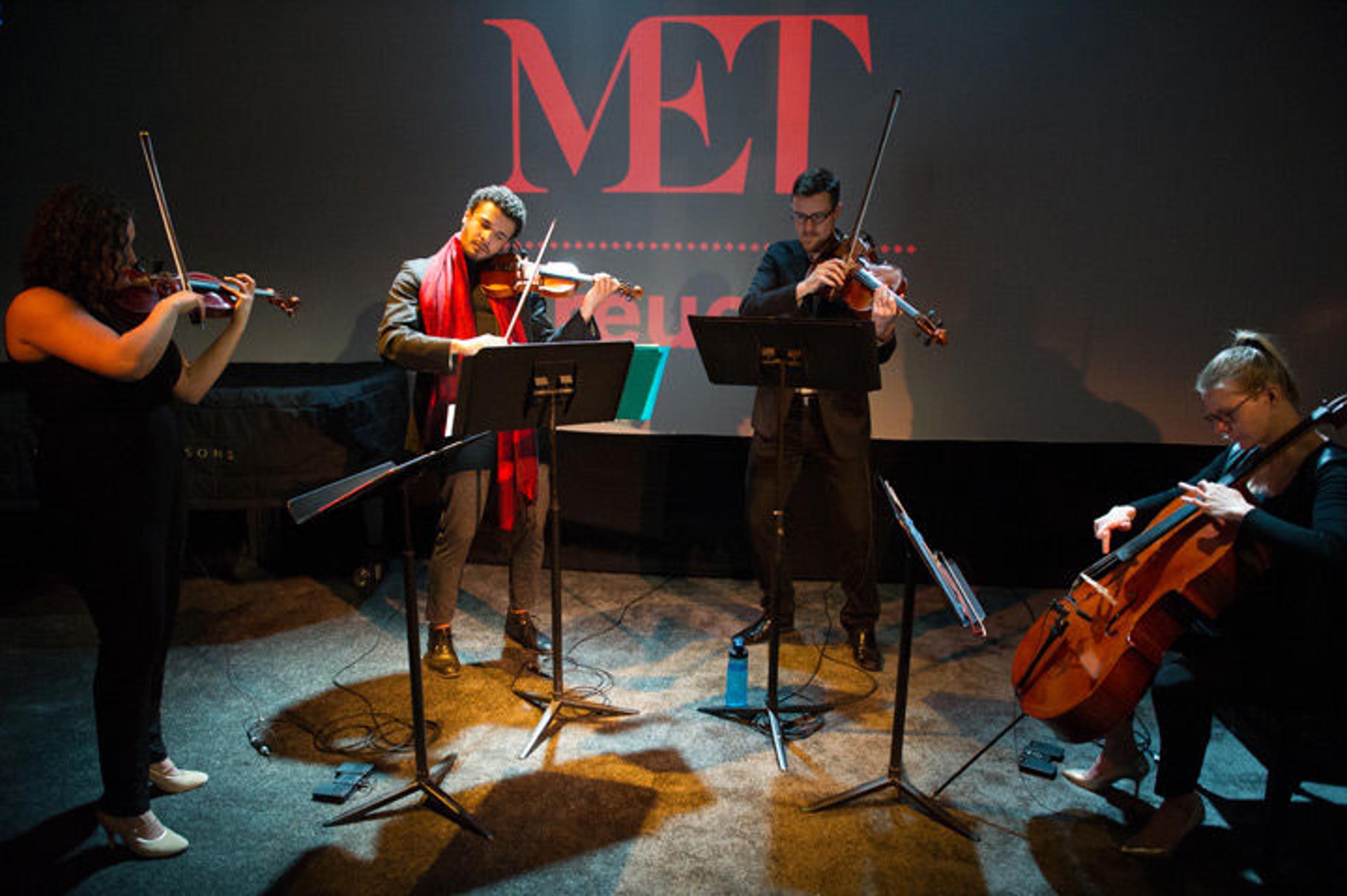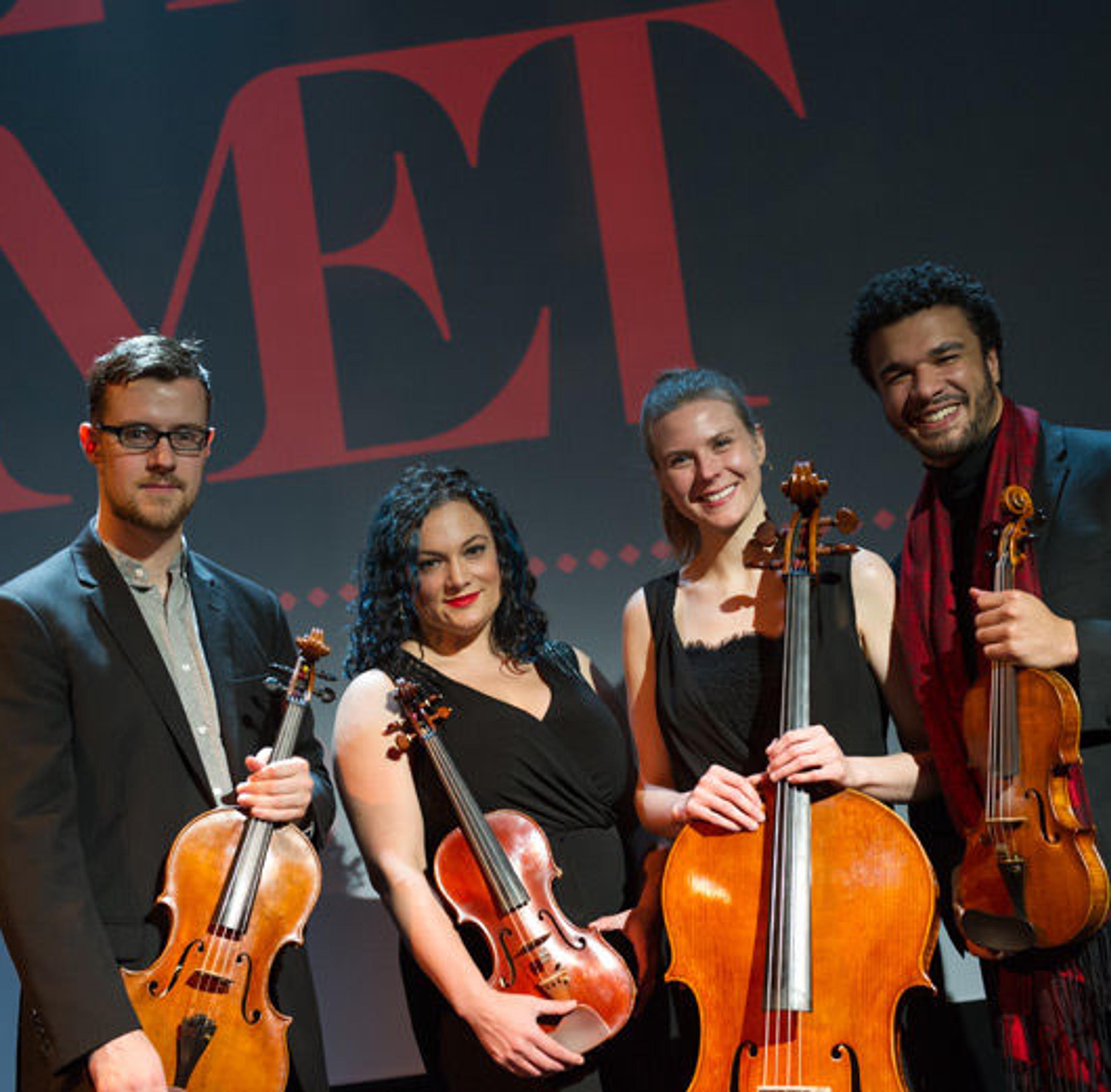
The members of PUBLIQuartet, from left to right: Nick Revel, Jannina Norpoth, Amanda Gookin, and Curtis Stewart. Photo by Paula Lobo
Since their founding in 2010, PUBLIQuartet has brought a fresh perspective to today's classical-music landscape thanks to their singular approach to programming, which often juxtaposes works from the quartet canon with commissioned compositions and new arrangements. Among the high-profile initiatives the New York–based ensemble have championed are PUBLIQ Access, which seeks to promote under-represented compositions and the work of young composers, and MIND|THE|GAP, a project that uses group improvisation to connect seemingly disparate musical genres, including rock, jazz, and electronic music.
As the 2016–17 MetLiveArts Quartet in Residence, audiences at The Met will get to see and hear PUBLIQuartet's passion and energy over the course of the season across The Met Fifth Avenue and The Met Cloisters. Ahead of their first concert on November 5, The New Baroque, I had the chance to speak with violinist Curtis Stewart and violist Nick Revel to discuss how the quartet has evolved since their formation, their process for programming concerts and commissioning new works, and which of The Met's spaces they're looking forward to exploring during their residency.
Michael Cirigliano: PUBLIQuartet has received a lot of praise for its nontraditional take on programming and audience outreach. How did you hone the group's mission in order to arrive at this innovative approach to concertizing?
Curtis Stewart: It's been a lot of trial and error—and time. The group started out as a fairly traditional classical quartet. We were interested in improvisation and new music, and each of us had a lot of background in those fields, but we didn't believe that they could be viable options for a career. There is only one Turtle Island String Quartet or Kronos Quartet, so I thought the traditional route was all that was available. However, being named Concert Artists Guild's New Music/New Places Ensemble affirmed that our pet projects were worth something more than we had originally estimated. More opportunities came along, and each time we were given the room to decide exactly what we wanted to play—while still aiming to tell a story and communicate a feeling—we became more confident in the PUBLIQuartet "concept." It was about tapping into what we really love, getting positive feedback from our tribe, and just believing in our passion.
Nick Revel: In college I discovered nontraditional quartets like Turtle Island, Kronos, and ETHEL—all of whom changed the way I thought about what a string quartet should and could be. It got me thinking that a quartet concert doesn't have to be a prix-fixe meal, so to speak. As PUBLIQuartet began to grow, we started incorporating these ideas into our programming. The first step was to ask questions like, "What if we paired Mozart with Webern?" Then, "What if we programmed our own individual compositions in a normal string quartet concert?" All of us, including founding member Jessie Montgomery, were already writing music for the group, which was the second step. The third step, which is still evolving with no particular destination in mind, is "Let's change our expectations of what Bach, or any other composer-god type, could be." And that involves our own radically different sound-sculpting, improvisation, and group composition within the context of these composers.

PUBLIQuartet performs in gallery 760 in The American Wing, September 2016. Photo by Filip Wolak
Michael Cirigliano: Many of your initiatives—including MIND|THE|GAP and PUBLIQ Access—focus on keeping so-called "classical" music relevant to contemporary audiences by performing standard repertoire alongside a wide range of other genres—including rock, improvisation, jazz, and spoken word. What are the connections the group sees among these styles, and how does that inform your process for putting together individual programs?
Curtis Stewart: I believe "style" is just an organizing principle, something that helps us focus on the music in a certain way. Crossing genres is not really a thing we do, it just happens as we compose as a group. We are playing our music, which stems from a classical tradition and training. The overriding influence is European art music, and we play on instruments from that culture, but our compositions embrace everything we hear from various styles. The process for creating these pieces is much like being in a band: one person comes in with an idea, more or less fleshed out, and we get together to work out the possibilities and uncover the layers of musical content.
Nick Revel: For about five years I taught music theory classes to elementary-school children, and every class we would start out with some guided listening. I made an observation over the years while doing this: the four parts in a Haydn string quartet can function in the exact same way as those in a James Brown tune. The cello holds down the bass, the inner voices are the rhythm guitar and horns, and the first violin is the lead melody. I started hearing so many connections in terms of musical function that connect disparate genres of music, which freed me from being bound by musical borders. I was then able to start listening in terms of energy and connections. So when PUBLIQuartet puts together a program, we see or hear the connections first, and then ask, "How can we convince people that these two pieces are actually related?"
Michael Cirigliano: The first program in your residency at The Met, The New Baroque, presents a selection of Bach's works alongside pieces from the 20th and 21st centuries. What are the parallels you hope audiences will hear between, say, a Bach prelude and fugue composed in 1722 and Heitor Villa-Lobos's Bachianas Brasileiras No. 5, which was written more than 200 years later?
Nick Revel: Most of the super-famous composers like Bach and Mozart were improvisers first; that's how they wrote their music. So a Bach fugue, something that music theorists have meticulously analyzed and codified, started out as an improvisation. A lot of modern music, like jazz, rock, blues, and live electronics, relies heavily on improvisation, so right there is a connection that most people don't talk about. Villa-Lobos was a huge fan of Bach and enjoyed employing some "Bach-like" musical devices into his work, such as highly contrapuntal lines weaving in and around the main melody. You can really hear a Bach-like quality in both the original Bachianas Brasileiras No. 5 and in our arrangement. It's in there. So we have connected all three points in time: Bach's original music; our modern sound-sculpture-influenced version of Bach; and a Villa-Lobos piece inspired by Bach, which Jannina arranged for the quartet to include improvisational elements.

Photo by Paula Lobo
Michael Cirigliano: This concert will also feature a performance of Extempore Anamnesis by Jihyun Kim, one of the composers involved with your PUBLIQ Access program. What are you learning about the future of the string quartet by regularly collaborating with young, emerging composers? How do they want to flip the switch, so to speak, on one of the most traditional of compositional forms?
Curtis Stewart: In my experience, a lot of composers aren't trying to flip the switch, but are exploring the possibilities and structures already developed by composers like Haydn, Bartók, Schnittke, and Shostakovitch. I see expansion as a filling in of possibility, rather than a changing of the guard. For example, Jihyun takes themes by Corelli and mashes them with techniques of Ligeti, Webern, and Carter, resulting in a cross-section that is a new take on the string quartet—something magical and mesmerizing and weird. To find beauty in new, unknown experiences is a task that challenges my own sense of value and worth in music in very expansive ways.
Michael Cirigliano: One of the many benefits of the MetLiveArts Quartet in Residence program is getting to be up close and personal with The Met collection. What are some of the Museum's artworks and iconic spaces are you looking forward to exploring throughout the season?
Curtis Stewart: I can't wait to play in The Met Cloisters! The vibe is just right, it is such a haven, and it is so close to where I grew up in the city, Inwood. It's amazing to be performing in a familiar space that always seemed distant and extracted from the normal New York City life, but is so close to my history and heart. Our recent MetFridays performance in The American Wing in front of Washington Crossing the Delaware was epic and inspiring. Limor Tomer [general manager of MetLiveArts] has been an amazing force in helping to conceptualize programs in various spaces, being a foil and narrowing in on our vision in various spaces.
Nick Revel: We have a concert planned for February entitled "What Is American?" Given the current election season, all of the racial and gender tensions in the media, and the growing gap between rich and poor, that question has never been more relevant. Our recent compositions—including a classical "remix" of Dvorak's American Quartet, our cellist Amanda's original composition, OWN, and others—have given a conscious nod to social justice. I am most excited about this concert asking deep, hard, controversial questions in the context of musical experience about what it means to be a good person in America. As far as the galleries go, The American Wing intrigues me the most at this moment because these questions are floating around in my brain. I imagine many of the artists represented in those galleries have been asking those same questions for hundreds of years.
This interview has been edited and condensed from the original.
To purchase tickets to any of PUBLIQuartet's upcoming performances or any other MetLiveArts event, visit www.metmuseum.org/tickets; call 212-570-3949; or stop by the Great Hall Box Office, open Monday–Saturday, 10:30 am–3:30 pm.
